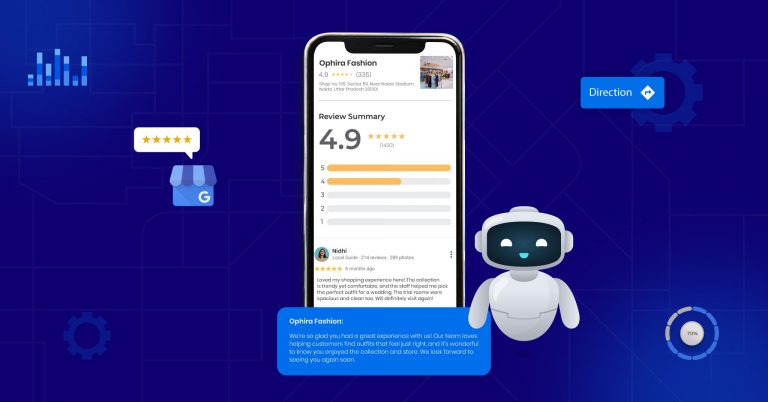A brand’s reputation now lives online, shaped daily by customer reviews, social posts, and digital conversations. For multi-location businesses, this reputation doesn’t just exist in one place—it spans across Google listings, social platforms, industry review sites, and community forums. Managing all of this in real time is not just complex; it’s nearly impossible without structured systems.
This is where AI-driven reputation management becomes essential. By applying artificial intelligence to track sentiment, flag risks, and suggest responses, businesses can shift from firefighting to foresight. Instead of chasing scattered reviews, brands can identify patterns, understand customer perceptions, and build trust with consistency.
In this blog, we’ll explore the impact of AI on online reputation management, break down its role in monitoring, analysis, and response, and show how platforms like SingleInterface help businesses integrate these capabilities into everyday workflows.
The Expanding Digital Footprint
Customers no longer interact with brands on a single channel. Google Reviews, local webpages, and social platforms all contribute to shaping reputation. Each platform has its own influence, which means feedback can spread faster and reach different audiences.
Scale of Multi-Location Businesses
A restaurant chain with 300 outlets may receive thousands of reviews monthly. Banks, dealerships, and retail chains must manage localized experiences while preserving a consistent brand reputation at the national or global level.
Risk of Missed Conversations
Research shows many customers expect a response to negative feedback within 24 hours. Delays or inconsistencies can quickly amplify dissatisfaction and harm credibility.
The Rise of User-Generated Content
Customers today create content in many forms such as short videos, reels, photos, and blogs. A single viral post, whether positive or negative, can influence public perception more than hundreds of standard reviews.
Greater Customer Expectations for Transparency
Modern consumers expect brands to not only respond quickly but also demonstrate honesty and accountability. Ignoring or giving generic responses can come across as dismissive and lead to lasting damage in trust.
This growing complexity doesn’t just challenge brands, it also exposes the gaps in existing monitoring practices.
Most businesses already keep an eye on their online reviews and social mentions. But as customer interactions multiply across platforms, monitoring by itself no longer guarantees effective reputation management.
This is where AI steps in, not only to handle the scale but also to transform scattered data into actionable intelligence.

Online reputation management integrated with AI, processes reviews, comments, and mentions instantly to detect sentiment—positive, negative, or neutral. Instead of waiting for weekly reports, businesses gain live insights that allow them to respond quickly and strategically.
Example: If a restaurant chain receives multiple complaints about delivery delays in one city, AI alerts the brand immediately, enabling them to resolve the operational issue before it worsens.
AI-based reputation management doesn’t mean robotic replies. Advanced systems analyze tone, context, and urgency, enabling businesses to craft responses that feel human while being scalable.
AI doesn’t just flag negative reviews—it detects unusual activity patterns that may signal deeper risks. Sudden spikes in negative mentions, fake reviews, or coordinated criticism can all surface quickly.
This predictive ability gives businesses time to act before an issue spirals into a crisis.
AI-driven reputation management tools consolidate feedback across Google Business Profiles, local webpages, and social channels into a single dashboard. This reduces fragmentation and makes it easier for teams to track performance and act consistently across every touchpoint.
Instead of treating each review as isolated feedback, AI systems analyze patterns over time. Businesses can measure:
The correlation between reputation and revenue growth
As AI continues to evolve, businesses, particularly the ones with large retail networks, can expect online reputation management to become:
AI strengthens human-led interactions by handling the scale and complexity of reputation management. Teams can then focus their empathy and judgment where it matters most—turning data-driven insights into meaningful customer experiences.
Online reputation is no longer an afterthought—it’s a primary driver of customer decision-making. Managing it requires speed, accuracy, and scale that manual oversight cannot provide. Online reputation management integrated with AI bridges this gap by monitoring reviews in real time, analyzing sentiment, suggesting authentic responses, and surfacing insights, which enables better decisions.
For multi-location businesses, this means reputation management is no longer just reactive—it becomes a lever for growth and differentiation.
At SingleInterface, we help businesses harness reputation data effectively, turning feedback into action and customer trust into long-term loyalty. To see how we can help you with reputation management, book a consultation or explore our solutions today.